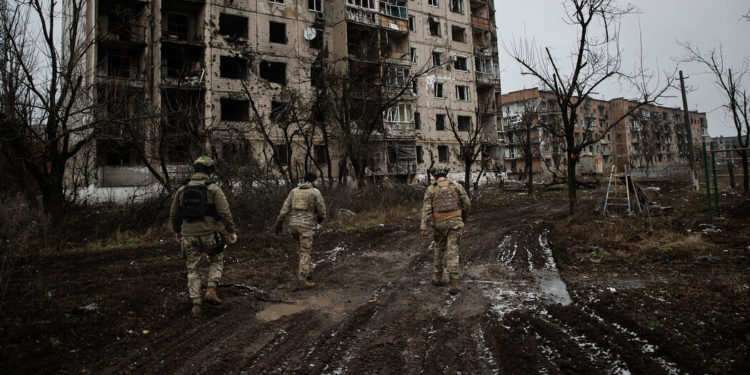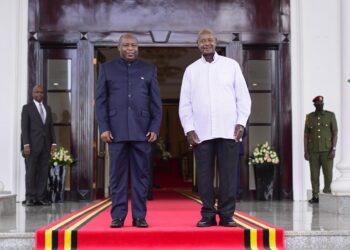By THE NEW YORK TIMES
As Chancellor Olaf Scholz of Germany broke ground for a new ammunition factory this week, he celebrated a move that should enable the country to restore its almost entirely depleted arsenal of artillery shells.
But despite his portrayal of the groundbreaking as another German response to Russia’s invasion of Ukraine, which began two years ago this month, it was also a reminder of how slow the European reaction has been. It will be a year before the new factory is able to produce 50,000 rounds annually, with hopes of doubling that in 2026.
That is too little and too late to help Ukraine at a moment of greatest need, and just as Washington’s own aid package may be faltering. And it is arguably late for Europe as a whole, as leaders warn that President Vladimir V. Putin of Russia, should he succeed in taking and holding even part of Ukraine, may try to test NATO’s commitment to defend every inch of its territory in the coming years.
Those realities, and new doubts about Ukraine’s long-term strategy, will all play into debates among its allies this week, first among NATO defense ministers meeting in Brussels on Wednesday and Thursday, and then at the opening of the annual Munich Security Conference.
At last year’s conference, there was talk of whether Ukraine was on the verge of a huge success and whether it could restore the borders that existed two years ago. This year, President Volodymyr Zelensky is expected to appear before the group for the first time since his country was invaded.
He will no doubt implore his Western supporters — especially Europe — for the artillery, the air defenses and the drones Ukraine needs just to maintain the current front lines in a brutal war of attrition.
This is not where the Western allies thought they would be as they gathered again in Munich. Ukraine’s much-anticipated “counteroffensive” failed to break through line after line of Russian trenches and mines, and constant surveillance by drones wiped out any hope of surprise attacks, Ukrainian generals said.
Instead, with Russia and its allies turning out huge amounts of shells, tanks and drones, Ukraine finds itself on the defensive, rationing its artillery shells and scrounging global arms markets for remaining stocks.
Even with the Senate’s passage of a $60 billion aid package for Ukraine on Tuesday, approval by the House is in doubt, and senior European defense officials say that their own arsenals have been depleted to such dangerously low levels that there is very little left to give.
Hanging over it all is the American presidential election, whose effects are being felt even now.
Former President Donald J. Trump’s line on Saturday that he would tell the Russians to “do whatever the hell they want” to allies who don’t spend enough on the military made headlines all over Europe. It was an unprecedented attack on the solidarity of the alliance, and it created shock waves among leaders.
At a joint news conference in Berlin with Poland’s new prime minister, Donald Tusk, on Monday, Mr. Scholz said: “NATO’s promise of protection applies unreservedly. All for one, one for all.”
Mr. Scholz did not utter Mr. Trump’s name, but said he was “absolutely sure” that NATO was vital to trans-Atlantic security. “We stick to it, the president of the United States sticks to it and I’m sure the American people will do so also,” the German leader said hopefully.
“Let me be clear on this occasion,” he said. “Any relativization of NATO’s guarantee of assistance is irresponsible and dangerous and is solely in Russia’s interests. Nobody is allowed to play or do deals with Europe’s security. We will strengthen NATO for the security of Europe.”
Mr. Tusk said that Mr. Trump’s words were “a cold shower” and pointed out that Poland is spending 4 percent of its economic output on defense. “We in Europe should clearly expect our partners, including those on the other side of the ocean, to honor this principle.”
On the social platform X, he was even more blunt. “Dear Republican Senators of America,” Mr. Tusk wrote, “Ronald Reagan, who helped millions of us to win back our freedom and independence, must be turning in his grave today. Shame on you.”
So the theme of this year’s Munich conference — “lose-lose” — seems to sum up Europe’s growing anxieties as it opens on Friday. European leaders worry about Mr. Trump’s unpredictability, and his seeming willingness to strike deals with Mr. Putin without involving Ukraine or its neighbors.
But they also realize that even if Mr. Trump loses, the days when large aid and arms packages for Ukraine sail through Congress are likely over — and the era of an American ironclad security guarantee may be over, too.
That means that Europe, whose future commitments to Ukraine are already larger than Washington’s, will likely have to spend far more on its own defenses and prepare for the possibility of a diminished American role in NATO.
But there is little prospect that Europe can replace the United States as a guarantor of security anytime soon — and not without sharply enhanced military spending beyond the NATO goal of 2 percent of economic output, which only 11 of the alliance’s 31 members currently meet.
That deficiency is a source of Mr. Trump’s critique. But Europeans suspect that his longstanding admiration for Mr. Putin, and his contempt for Ukraine, lie at the core.
On Wednesday, NATO announced that 18 countries will meet the 2 percent target this year.
Yet numbers tell only part of the story. Europe’s ultimate defense is the American nuclear arsenal, including arms stored from Germany to Turkey, but it is meaningless if there are doubts that the United States would actually come to the aid of even the smallest or most vulnerable of NATO nations.
The NATO secretary-general, Jens Stoltenberg, seemed to be getting at the damage that was already done, saying on Sunday: “Any suggestion that allies will not defend each other undermines all of our security, including that of the U.S., and puts American and European soldiers at increased risk.”
And at the moment, said Claudia Major, a defense expert at the German Institute for International and Security Affairs, Europe could not defend itself against Russia in a conventional conflict without the help of the United States.
To be really prepared to fight Russia, said Armin Papperger, the chief executive of the company building the ammunition factory, Europe would need 10 years to rebuild militaries that atrophied during the post-Cold War and whose arsenals were depleted in the rush to save Ukraine.
But even to be “fine,” he told the BBC, would require three or four years of enhanced military spending and production.
Estonia’s prime minister, Kaja Kallas — whom Russia has just declared a “wanted” criminal — said Mr. Trump’s remarks were “something to maybe wake up some of the allies who haven’t done that much.”
In fact, what Mr. Trump has accomplished is a speeding up of the discussion about what NATO would look like without the United States at its center.
Annalena Baerbock, Germany’s foreign minister, met near Paris on Monday with her Polish and French counterparts, Radoslaw Sikorski and Stéphane Séjourné, in a revival of what is sometimes called the “Weimar Triangle.”
In a joint statement, the three captured the European mood well, saying that the meeting was taking place at a time of “ambiguity, unpredictability, uncertainty and instability.”
While creating more certainty and stability will require spending a lot more money, NATO is still debating whether to set a new and higher goal.
That makes a common European defense still something of an aspiration, said Daniel Fiott of the Brussels School of Governance. “Sentiment is not enough” for the Europeans, he said. “Otherwise they remain at the level of a think tank. Action, real action, please!”







Discussion about this post